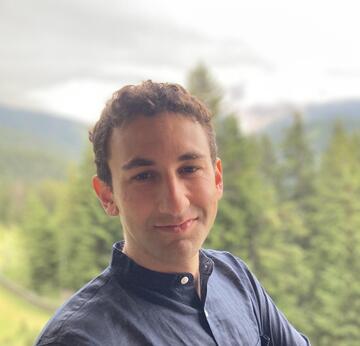Daniel Walden
Specializations:
History of theory; analysis of music of the nineteenth and twentieth centuries; global history (primarily Europe, Japan, and North India); practice-based research; tuning and temperament; history of the keyboard; music and the history of science, technology, and society; colonial history and decolonial theory; music and metaphor; ancient music theory; music theory in sixteenth-century Italy; contemporary and experimental performance practice; instrument construction and design
About:
My scholarship focuses on the global history of music theory, particularly in the nineteenth and twentieth centuries. I am interested in how musical thought shapes (and is shaped by) the politics of colonialism and resistance, as well as the role that media play in our evolving understanding of musical structures. In pursuing these interests, I draw regularly on my experiences as a pianist and harpsichordist, guided by the conviction that theoretical inquiry is deepened by connection with practical experience.
I am currently writing my first book, A New World of Sound: Just Intonation and the Making of Modern Music Theory, which traces the emergence of just-intonation theories and practices from a global network of scholars, musicians, and instrument builders spanning Japan, India, Germany, Sierra Leone, and Mexico. I examine my experiences restoring, recreating and performing on historical just-intonation keyboards, and analyze how these instruments altered how musical nature and the politics of nationhood and identity were understood. Extracts of this work can be found in History of Humanities and a forthcoming article for the Journal of the American Musicological Society. I am also developing a second book project that examines the political ramifications behind two turning points in the nineteenth-century history of music theory: the introduction of probabilistic statistics and the development of the epistemological strategy that upheld musical parameters as separate and discrete. I will show how these developments drew on colonial logic and paved the way for the analytics of Big Tech corporations like Spotify, focused on harnessing massive reservoirs of musical data towards the generation of capital. My first forays into this topic appear in the Oxford Handbook of Timbre and Key Terms in Music Theory for Anti-Racist Scholars (forthcoming).
At the same time, I am working on several interrelated research projects. With Jonathan Service, I am completing a volume with translations of the German- and Japanese-language scholarship of the Meiji-era theorist Tanaka Shōhei, whose ideas also feature extensively in my book. With Nina Sun Eidsheim, J. Martin Daughtry, and Dylan Robinson, I am also assembling an edited volume (currently) titled Name/Understand/Play: Metaphors in Music and Sound, which will combine essays, creative writing, and graphic scores that explore the social, cultural, and political ramifications of metaphors about music. I have additionally obtained grants from the British Academy and Leverhulme Trust for my initiative New Instruments For Theory [NIFTY], focused on developing a suite of digital and DIY instruments for new directions in music-theoretical research and pedagogy. The first NIFTY instrument, a reconstruction of Tanaka’s just-intonation “enharmonium” that I designed in collaboration with instrument builder Georg Vogel, was completed in July 2023.
As a performer, I specialize in both contemporary music and historical repertoire on period instruments. I received early career support from the Leonore Annenberg Arts Fellowship for the Performing and Visual Arts for my projects aimed at exploring historical and contemporary microtonal repertories. My first album, Dual Synthesis for harpsichord and electronics, was described as “one of the most outstanding recordings of new music in this century” (New York Classical Review) and profiled by the New York Times as one of “Five Harpsichord Works You Need to Know.” You can learn more about my recordings and performances on my personal website.
Prior to arriving in Yale, I was an Assistant Professor in Music Analysis at Durham University in the UK, and a Junior Research Fellow in Music at The Queen’s College (Oxford). I obtained my PhD in Music Theory from Harvard University as a Presidential Scholar, an MPhil in Music Studies from University of Cambridge (King’s College) as a Gates Scholar, and a BMus and B.A. in Piano Performance and Classics at Oberlin College and Conservatory.
Selected Publications:
“The Global Tonnetz.” Journal of American Musicological Society, 77:2 (2024): 447–509.
“Tanaka Shōhei’s Keyboards As Instruments of the Global History of Theory,” with Tanaka Tasuku, Acta Musicologica 95:2 (2023): 151–76.
“From Pitch Fundamentalism to Data Fundamentalism,” in Jade Conlee and Tatiana Koike (eds.), Insurgent Music Theory: Terminology and Critical Methods for Antiracist Studies (University of Michigan Press, forthcoming)
“Organizing Modernity: Henry Liston’s Euharmonic Organ and Natural Tuning in Company India,” in Carmel Raz and James Grande, (eds.), Sound and Sense in Britain, 1770-1840 (Cambridge University Press, 2023): 201-223.
“No Conclusions / The Work of Western Botanical Metaphors in Ethnographies of Native American Song,” With Nina Sun Eidsheim. Kalfou: A Journal of Comparative and Relational Ethnic Studies 9/2 (2023)
“Pitch vs. Timbre,” in A. Rehding and E. Dolan (eds.), The Oxford Handbook to Timbre (Oxford University Press, 2019): 641–675.
“Daniele Barbaro, Nicola Vicentino, and Vitruvian Music Theory in Sixteenth-Century Italy,” in V. Zara et al. (eds.), Daniele Barbaro. Vénitien, patricien, humaniste (Brepols: 2018), 373-388.
“Composing at the Keyboard: Assessing the Theory Behind Schoenberg’s Musical Typewriter,” Keyboard Perspectives 10 (2017): 113-134.
“Emancipate the Quartertone: The Call to Revolution in Nineteenth-Century Music Theory,” History of Humanities, 2:2 (2017): 327-344.
“Charting Boethius: Music and the Diagrammatic Tree in the Cambridge University De institutione arithmetica,” Early Music History 34 (2015): 207-238.
“Dom Mocquereau’s Theories of Music and Romantic Musical Aesthetics,” Études grégoriennes 23 (2015): 125-150.
“Frozen Music: Music and Architecture in Vitruvius’ De Architectura,” Greek and Roman Musical Studies 2 (2014): 124-145.
“Noting Images: Understanding the Illustrated Manuscripts of Mendelssohn’s Schilflied and Hindemith’s Ludus Tonalis,” Music Theory Online, 16:3 (2010) [also translated into Farsi by Farshad Moshfeghi for Iran’s Music Report Magazine, 2012]
